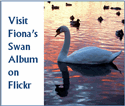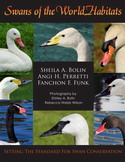Ask the Swan Specialist
Date: 24 April 2009
Hi Connie:
Your veterinarian would know best about the antibiotics and what can be used in most instances as well as items that she can prescribe or suggest for the first aid kit. We would recommend to include but not limit the following items:
Dawn Dish Soap (Fairy Liquid if in U.K). for cleansing feathers and this acts as a good antimicrobial soap but gentle on the feathers.
Small squirt bottle with water to help cleanse a wound.
Alcohol Swabs to help cleanse the area around the wound. We would not recommend direct contact with the wound with the alcohol because of the burning sensation. We mainly use the alcohol to wet down feathers so that you can see the wound area.
Bottle of Peroxide for cleansing the wound.
Gauze to wrap and clean a wound. DO NOT USE COTTON, it can stick to a wound.
Sterile Swabs (looks like long Q-tips packaged in sterile container
Nitrate Swabs (Long Q-tips with nitrate for chemically cauterizing such as a blood feather wound-Veterinarian may need to advise you on purchase of this item as well as the correct usage).
Iodine
Neosporine
Antibiotic eye ointment (must get prescription from veterinarian, but this ointment can be used for small nicks around the eye as well as eye infections. Do not place on eye unless veterinarian first checks for eye infection).
Surgical glue- to be used for small cuts that need to be closed after cleansing, when sutures are not necessary.
Blanket (Very important to wrap bird in when transporting immediately following injury to help maintain body warmth especially in cygnets. Cygnets can be wrapped in towels, however, you must watch so that they do not become entangled and either declaw or strangle themselves.
Heating pad
Medicam (we use this as an anti-inflammatory) you need to check with your vet. This medicine is delivered by syringe orally. Weight of bird very important to determine dosage.
Scales (Kg or lb-most vets prefer Kg. This item readily lets the veterinarian know the weight to determine dosage of a medicine as well as keep an eye on the health of the bird. If sudden or extreme weight loss occurs, it may be a symptom of distress, infection, parasites or something going wrong with the bird).
Digital thermometer with KY Jelly or other lubricant. Veterinarian needs to show you how to conduct a rectal temperature check so that you do not perforate the cloaca.
Normal body temperature of a swan is about 106 degrees F. Cygnets run slightly higher. Stress in a swan can rapidly increase body temperature. Loss of core temperature is not a good thing and that is why a blanket or heating pad (not directly placed onto the bird) is of importance after injury.
Towels (Very important) to keep bird dry as well as wound.
It is important that the injured swan be seen immediately by a veterinarian. If your primary veterinarian is not available, have her suggest another vet in the area. This is extremely important due to the possibility of not only infection from animal bites, but the ripping and tearing of flesh and underlying tissue. If the dead tissue is not removed, new tissue can be prohibited from growth, additional chance for infection may occur and the ensuing infection can kill the bird
The same techniques used in humans should be afforded an injured swan:
Check for airway, is it able to breath?
Check for pulse, is it rapid or shallow?
Stop or control the bleeding
Cleanse the wound if emergency vet care is not readily available
Immobilize the appendage or the injured part of the body
Immobilize the animal so that it cannot move freely and reinjure the wound (wrap in blankets or towels)
Get to the nearest hospital immediately
These are just a few of the basic care items. Again, your veterinarian can possibly suggest more items. The Regal Swan
Messages In This Thread
- swan first aid -- Connie Erwig -- 24 April 2009
- Swan First Aid -- The Regal Swan -- 24 April 2009
Ask the Swan Specialist is powered by
Tetra-WebBBS 5.30 Beta © 2006-2007 Tetra-Team






